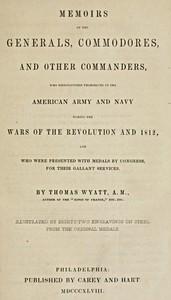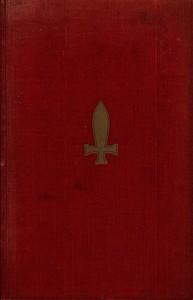Read this ebook for free! No credit card needed, absolutely nothing to pay.
Words: 90967 in 20 pages
This is an ebook sharing website. You can read the uploaded ebooks for free here. No credit cards needed, nothing to pay. If you want to own a digital copy of the ebook, or want to read offline with your favorite ebook-reader, then you can choose to buy and download the ebook.


: Memoirs of the Generals Commodores and other Commanders who distinguished themselves in the American army and navy during the wars of the Revolution and 1812 and who were presented with medals by Congress for their gallant services by Wyatt Thomas - United
PAGE FIGURE; PLATE GEN. GEORGE WASHINGTON, 9 1; 1 GEN. ANTHONY WAYNE, 17 4; 2 MAJ. JOHN STEWART, 40 3; 2 LIEUT. COLONEL DE FLEURY, 42 5; 2 MAJ. ANDRE, CAPTURE OF, 48 10; 4 GEN. NATHANIEL GREENE, 52 6; 3 GEN. HORATIO GATES, 59 8; 3 GEN. DANIEL MORGAN, 63 7; 3 COL. EAGER HOWARD, 70 9; 4 COL. WILLIAM A. WASHINGTON, 79 2; 1 MAJ. HENRY LEE, 84 11; 4 GEN. WINFIELD SCOTT, 89 12; 5 GEN. EDMUND P. GAINES, 101 14; 5 GEN. JAMES MILLER, 113 13; 5 MAJ.-GENERAL JACOB BROWN, 129 16; 6 MAJ.-GENERAL RIPLEY, 135 17; 6 GEN. PETER B. PORTER, 147 15; 6 GEN. ALEXANDER MACOMB, 151 18; 7 GEN. ANDREW JACKSON, 160 19; 7 GEN. ISAAC SHELBY, 164 20; 7 GEN. WM. HENRY HARRISON, 175 21; 8 LIEUT.-COLONEL CROGHAN, 181 22; 8 PAUL JONES, 186 23; 8 CAPT. THOMAS TRUXTUN, 193 24; 9 COM. EDWARD PREBLE, 202 25; 9 CAPT. ISAAC HULL, 206 26; 9 CAPT. JACOB JONES, 214 27; 10 CAPT. STEPHEN DECATUR, 222 28; 10 COM. BAINBRIDGE, 229 29; 10 OLIVER HAZARD PERRY, 236 30; 11 COM. ELLIOTT, 241 31; 11 LIEUT. WILLIAM BURROWS, 249 32; 11 LIEUT. EDWARD R. McCALL, 257 33; 12 CAPT. JAMES LAWRENCE, 261 34; 12 CAPT. THOMAS MACDONOUGH, 270 35; 12 CAPT. ROBERT HENLEY, 278 36; 13 CAPT. STEPHEN CASSIN, 281 37; 13 COM. WARRINGTON, 285 38; 13 CAPT. JOHNSTON BLAKELEY, 289 39; 14 CAPT. CHARLES STEWART, 297 40; 14 CAPT. JAMES BIDDLE, 307 41; 14
GEN. GEORGE WASHINGTON.
Among those patriots who have a claim to our veneration, George Washington claims a conspicuous place in the first rank. The ancestors of this extraordinary man were among the first settlers in America; they had emigrated from England, and settled in Westmoreland county, Virginia. George Washington, the subject of these memoirs, was born on the 22d February, 1732.
At the time our hero was born, all the planters throughout this county were his relations--hence his youthful years glided away in all the pleasing gayety of social friendship. In the tenth year of his age he lost an excellent father, who died in 1742, and the patrimonial estate devolved to an elder brother. This young gentleman had been an officer in the colonial troops, sent in the expedition against Carthagena. On his return, he called the family mansion Mount Vernon, in honor of the British admiral with whom he sailed. George Washington, when only fifteen years of age, ardent to serve his country, then at war with France and Spain, solicited the post of midshipman in the British navy, but the interference of a fond mother suspended, and for ever diverted him from the navy. His devoted parent lived to see him acquire higher honors than he ever could have obtained as a naval officer; but elevated to the first offices, both civil and military, in the gift of his country. She, from long established habits, would often regret the side her son had taken in the controversy between her king and her country. The first proof that he gave of his propensity to arms, was in the year 1751, when the office of adjutant-general of the Virginia militia became vacant by the death of his brother, and Mount Vernon, with other estates, came into his possession. Washington, in his twentieth year, was made major of one of the militia corps of Virginia. The population made it expedient to form three divisions. When he was but just twenty-one, he was employed by the government of his native colony, in an enterprise which required the prudence of age as well as the vigor of youth. In the year 1753, the encroachments of the French upon the western boundaries of the British colonies, excited such general alarm in Virginia, that Governor Dinwiddie deputed Washington to ascertain the truth of these rumors; he also was empowered to enter into a treaty with the Indians, and remonstrate with the French upon their proceedings.
On his arrival at the back settlements, he found the colonists in a very unhappy situation, from the depredations of the Indians, who were incessantly instigated by the French to the commission of continual aggressions. He found that the French had actually established posts within the boundaries of Virginia. Washington strongly remonstrated against such acts of hostility, and in the name of his executive, warned the French to desist from those incursions. On his return, his report to the governor was published, and evinced that he had performed this honorable mission with great prudence.
It was in consequence of the French calling themselves the first European discoverers of the river Mississippi, that made them claim all that immense region, whose waters run into that river. They were proceeding to erect a chain of posts from Canada to the Ohio river, thereby connecting Canada with Louisiana, and limiting the English colonies to the east of the Alleghany mountains. The French were too intent on their favorite project of extending their domain in America, to be diverted from it by the remonstrances of a colonial governor.
This induced the Assembly of Virginia to raise a regiment of three hundred men to defend their frontiers and maintain the right claimed by their king.
Of this regiment, Professor Fry, of William and Mary College, was appointed colonel, and George Washington lieutenant-colonel. Fry died soon after the regiment was embodied, and was succeeded by our hero, who paid unremitting attention to the discipline of his new corps. The latter advanced with his regiment as far as Great Meadows, where he received intelligence, by the return of his scouts whom he had sent on to reconnoiter, that the enemy had built a fort, and stationed a large garrison at Duquesne, now Pittsburgh. Having now arrived within fifty miles of the French post, Washington held a council of war with the other officers, but while they were deliberating, a detachment of the French came in sight and obliged them to retreat to a savanna called the Green Meadows. On an eminence in the savanna they began to erect a small fortification, which he named Fort Necessity.
On this redoubt they raised two field-pieces. On the following day they were joined by Captain McKay, with a company of regulars, amounting now to about four hundred men. Scarcely had they finished their entrenchments when an advanced guard of the French appeared in sight, at which the Americans sallied forth, attacked and defeated them; but the main body of the enemy, amounting to fifteen hundred men, compelled them to retire to their fort.
The camp was now closely invested, and the Americans suffered severely from the grape shot of the enemy, and the Indian rifles. Washington, however, defended the works with such skill and bravery, that the besiegers were unable to force the entrenchments. After a conflict of ten hours, in which one hundred and fifty of the Americans were killed and wounded, they were obliged to capitulate. They were permitted to march out with the honors of war, to retain their arms and baggage, and to march unmolested into the inhabited parts of Virginia. The legislature of Virginia, impressed with a high sense of the bravery of our young officer, voted their thanks to him and the officers under his command, and three hundred pistoles to be distributed among the soldiers engaged in this action.
Great Britain now began to think seriously of these controversies, and accordingly dispatched two regiments of veteran soldiers from Ireland, commanded by General Braddock. These arrived early in 1755, and their commander, being informed of the talents and bravery of George Washington, invited him to serve in the campaign as his aid-de-camp.
The invitation was joyfully accepted by Washington, who joined General Braddock near Alexandria, and proceeded to Fort Cumberland; here they were detained, waiting for provisions, horses, wagons, &c., until the 12th of June. Washington had recommended the use of pack horses, instead of wagons, for conveying the baggage of the army. Braddock soon saw the propriety of it and adopted it. The state of the country, at this period, often obliged them to halt to level the road, and to build bridges over inconsiderable brooks. They consumed four days in traveling over the first nineteen miles. On the 9th of July they reached the Monongahela, within a few miles of Fort Duquesne, and pressing forward, without any apprehension of danger, a dreadful conflict ensued; the army was suddenly attacked in an open road, thick set with grass.
Free books android app tbrJar TBR JAR Read Free books online gutenberg
More posts by @FreeBooks

: Vijftien dagen te Londen op het einde van 1815. by Defauconpret A J B Auguste Jean Baptiste - London (England) Social life and customs 19th century


: Matkustus Brasiliassa: Kuvaus luonnosta ja kansoista Brasiliasta by Vainio Edv A Edvard August - Brazil Description and travel; Natural history Brazil; Brazil Social life and customs 19th century




